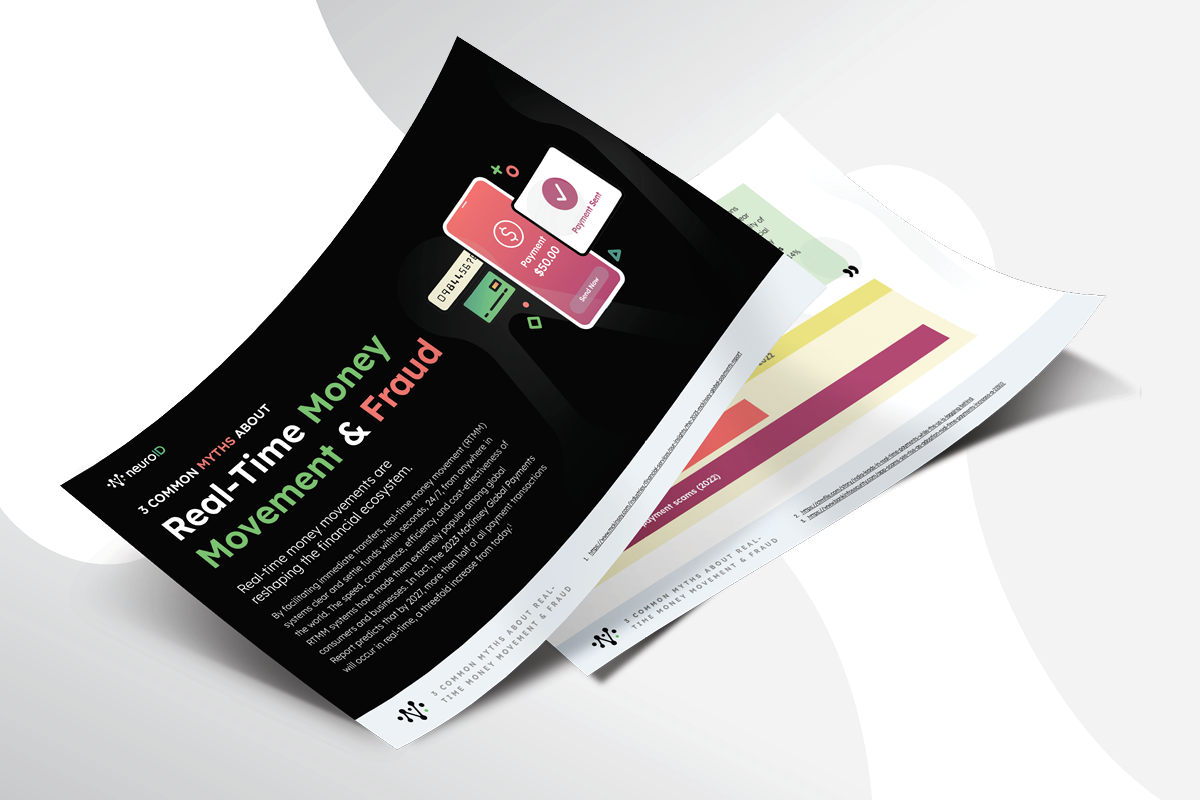
FedNow, Fraud Now? Updates on Fraud Management for Fast Money
“Not all customers know yet what [instant payments] mean to them, but they will adopt and it will become table stakes. It will become something that’s expected every day by every consumer and corporate and commercial customer.”
Liana Muller, U.S. Bank, Senior VP of Emerging Money Movement Product Strategy
The FedNow Service is not just a payment processing platform; it’s a change catalyst for the entire U.S. economy. As a cloud-based, neutral-access platform, FedNow was predicted to drive banks, payment processors, and services providers towards real-time money movement systems—whether they were ready or not.
It’s been 6 months since launch—have those predictions of upending the financial landscape come true? And how has the fraud-fighting world been impacted?
The Cascading Impact of FedNow
Fraud has always been skulking in the shadows of the FedNow Service launch. Even the Federal Reserve itself recognized the new risk landscape it was creating: “Individuals, businesses, financial institutions and technology providers may be able to combat instant payments fraud similarly to how they combat fraud for other payment types, but it’s wise to review and adjust these measures accordingly in light of instant payment characteristics,” says FedNow’s own FAQ. This has been the Federal Reserve’s general stance from launch through today—they know fraud is an issue with real-time money movement (RTMM), and that their FedNow Service is forcing the financial industry into a stand-off between fast money and fiendish fraudsters. But fraud risks are no longer considered a good enough reason to avoid real-time payment rails—instead, fraud is a problem for financial institutions (FIs) to solve if they want to stay relevant and competitive.
And are FIs solving it?
By its very nature, real-time money moves at a speed that traditional U.S. payment systems—and traditional fraud systems—do not. This inherent irrevocability creates a new level of fraud vulnerability, and is one of the reasons FIs have been dragging their feet to adopt (until the FedNow Service forced their hands). But while the U.S. is just starting to incorporate real-time payments at scale, other countries have learned the fraud lessons for us. For example, Asia Pacific-based banks, where peer-to-peer transfers and mobile payment platforms are the norm, have seen a 78% fraud increase due to real-time money movement, with 58% of those banks expecting fraud to continue to rise due to real-time transaction risks. Authorized Push Payment (APP) scams are the most common way fraudsters target real-time money movement and are currently ranked the number one fraud risk in the world, with 20% of global consumers victimized in the past four years. And of those 20% of victims, 27% of them were hit by real-time payment scams (no other fraud type ranked as high).
What does this mean for the U.S. FIs trying to fight real-time fraud?
A New Mindset Around Fraud & Responsibility
For starters, we’re facing a mindset shift around security and responsibility. While APP scams are traditionally seen as the consumer’s problem to solve, that mindset is shifting for banks, fraud professionals, and (most importantly) regulators. In the EU, where consumers lost £485.2M ($618M) to APP scams in 2022, regulators are already taking notice and taking aim at FIs with a Payment Systems Regulator (PSR) proposal that would require the sending bank (the scam victim’s bank) and the receiving bank received the scam to fully reimburse victims, splitting the cost 50/50. If U.S. FIs wish to avoid a similar regulatory fate, it’s in their own best interest to proactively protect consumers now, rather than a laissez-faire approach that forces regulations in the future.
“ There’s no question that fraudsters like fast money. The question is, what are we going to do about it? Should the banks be doing more? If banks take a hands-off approach to APP scams and similar real-time payment threats, there will be increasing regulatory scrutiny and banks will regret that,” says David Liu, expert in fraud risk management and fraud consultant for Fortune 500 banks, fintechs, and fraud solutions providers. “Regulators will look at you with very stern eyes [if you ignore APP scams] and it will not be good. Banks will face consequences to real-time payment fraud, even if they’re not immediate.”
“The recent launch of the FedNow® Service in the U.S. will likely spur a wider embrace of instant payments. Its increased adoption may push FIs and other enterprises to reconsider the tools and processes they have on hand to fight fraud and zero in on behavioral characteristics . . . firms must adopt an anti-fraud mindset that’s proactive instead of reactive, and analyze data and transactions in real-time.”
PYMNTs article, Jan. 2024
That mindset shift extends to re-evaluating fraud stacks with new goals in mind. Everyone from FIs to industry publications to independent researchers agree: real-time money leads to real-time fraud, and today’s tools aren’t prepared. There’s a clear need to audit your fraud stack and look for opportunities to incorporate more advanced, machine learning-driven approaches that can operate effectively within near instantaneous processing times. This requires a shift towards real-time, sophisticated analytics and machine learning techniques to detect fraudulent intent earlier, rather than relying solely on conventional methods that simply cannot respond swiftly enough to the dynamics of real-time transactions.
Fast Money is Here to Stay
Since its initial 35 adopters in July 2023, FedNow has grown to 330+ financial institutions across 45 states with assets ranging from $500 million to $3 trillion. This includes everyone from cutting-edge fintechs such as Plaid, to established, traditional FIs such as Virginia’s Treasury Department. There is a clear demand for real-time payments across the financial ecosystem, which means it will soon become a competitive differentiator. We’re already seeing those consumer expectations rippling, with 80% of U.S. consumers saying they want faster, more direct payments, 70% saying that access to faster payment capabilities from their FI is an important satisfaction driver, and 15% even saying it’s a differentiator they look for in choosing banks.
As FedNow and similar services continue to enhance transaction efficiency, payroll processing, bill payments, and overall cash flow management, consumers and businesses alike are going to take notice. An Accenture Research Report predicts that card-issuing banks who don’t implement real-time payments will lose out on 4.6% of total global card and online payments revenues, or $89 billion, in the next three years, along with consumers’ trust and market share.
Fraud concerns can’t be a barrier to adoption. Sitting back and waiting means being left behind, and shrugging in the face of consumers being defrauded by APP fraud and similar real-time scams will break the trust and confidence of customers and regulators alike.
Fraud Concerns at the Forefront
In the FedNow-transaction transformation era, traditional fraud detection methods lag behind. They rely on verifying PII data and using a second factor of authentication or biometrics—tools that are ineffective in stopping APP fraud and similar scams. The real-time environment has forced a more proactive approach to fraud management, where prevention is as instant as the transactions themselves.
FIs are increasingly turning to advanced technologies such as NeuroID’s behavioral analytics for real-time, frictionless fraud detection. NeuroID solutions analyze vast amounts of behavioral, device, and network data instantaneously, identifying risk-based patterns that indicate fraudulent intent and coercion. Behavioral analytics offers another layer of security, scrutinizing user behavior to differentiate between legitimate customers and potential fraudsters: all in friction-free real-time.
There’s no simple solution to the fraud dangers of RTMM, but you don’t have to go it alone. Our RTMM webinar series will connect you directly to fraud experts with answers to your real-time payment questions, and our guidebook analyzes some of the trickiest misconceptions to overcome with fraud and RTMM. Behavioral analytics and real-time are synonymous to the digital age, and together they create support for your growth goals in the fast-changing world.




